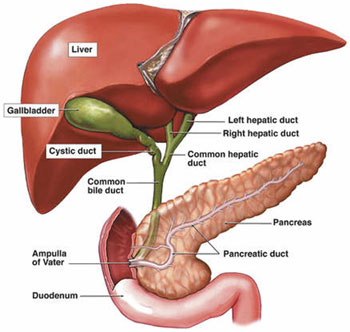
What Causes SIBO? – Bile and Enzymes
As the small intestine is actually an alkaline environment or “terrain” this another part of how our bodies reduce the growth of bacteria. All bacteria, just like all enzymes in our bodies, require a certain pH (acid base balance) in order to grow or work. Altering the pH of the intestinal environment can favour certain bacteria to grow, and those bacteria actually produce more acid, which favours even more growth. This is why hydrogen (a measure of acidity) is actually a part of SIBO testing. High hydrogen levels are actually not normally part of our exhaled air, and indicate the growth of bacteria in our intestines.
Reducing bile secretion is another detrimental effect of anti-acid medication. Other causes of poor bile secretion are genetic, as I mentioned in a previous blog, like Gilbert’s Syndrome, or a combination of functional and genetic causes of poor liver metabolism. Functional and genetic causes of poor bile production could come from the consumption of alcohol, many medications or birth control pills. These substances put functional stress on our livers that result in a greater requirement for detoxification, which requires more nutrients from the diet to support.
In doing a lot of functional liver tests, stool tests and genetic tests with clients, I see the poor production of bile frequently. This is known as biliary insufficiency and happens for many reasons. Regardless of the exposure and the genetic factors that contribute to biliary insufficiency, our livers use “nutrients” to detoxify. There are a host of amino acids, proteins, vitamins and minerals that are used in the detoxification process, which can be affected by SIBO and as indicated, can result in more SIBO!
Bile is a product of the liver to help remove garbage from our bodies. More than 50% of the garbage we are required to remove actually comes from bacteria and yeast in our intestines. This is for a “normal” person, but when bacterial overgrowth is identified, the amount or garbage that our liver is required to remove can go up substantially. This, in part, occurs do to the decojugation of bile in our intestines by bacteria, which allows for toxins to be reabsorbed into the body. The deconjugation of toxins in our guts are enhanced significantly by SIBO and once a toxin is reabsorbed by the body it puts even more stress on the liver to remove the toxin from the body again.
I have interpreted many hundreds of stool tests over my career which measure the digestion and absorption of our macronutrients; proteins, carbohydrates and fats. With all of stool tests that I have seen it is rare for people to have pancreatic enzyme deficiencies yet this is one of the most commonly sold dietary supplement around. In stool testing, the actual secretion of pancreatic enzymes by the pancreas can be measured by the amount of stool Elastase 1. As it is very rare to see Elastase 1 deficiency in functional stool analysis why do so many people take enzymes and say that they work?! The likely answer to this question is SIBO. When bacteria are found to be high in the early samples of the test this can indicate a lower pH in earlier parts of the small intestine which can actually impair the digestive function of these enzymes that results in poor digestion of protein, fats, and carbohydrates from our diet.
You see pancreatic enzymes actually require a high pH to work. This is, in part why the pancreas secretes bicarbonate with the digestive enzymes it produces. If hydrogen forming bacteria are present in the small intestine these bacteria can sufficiently lower the pH (making the terrain more acidic) which results in “functional” pancreatic insufficiency. Essentially the lower pH results in the enzymes not being able to do the job of digesting protein, fat and carbohydrates which leaves even more food for the bacteria to grow and results in even more “stress” on the livers detoxification ability.
You must be logged in to post a comment.